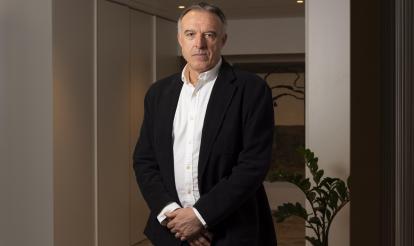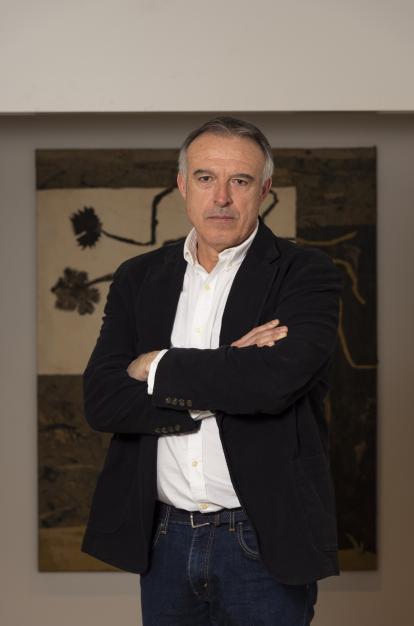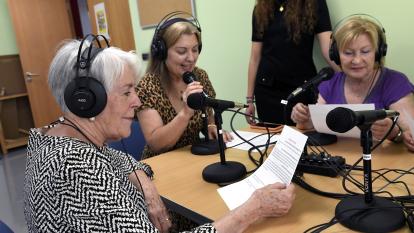
You are reading:

You are reading:

08.04.25
8 minutes readSend your questions to:
Scientific director
of the programme for the Elderly of the ”la Caixa” Foundation
We are living longer and in better conditions than previous generations, but one of the great challenges now is to give that time meaning. Later life is no longer just a stage of rest, but also an opportunity for personal development and contribution to the common good. Javier Yanguas, psychologist, gerontologist and scientific director of the programme for the Elderly of the ”la Caixa” Foundation, reflects on ageing as a process full of possibilities and challenges.
How has the group we understand as older adults changed in recent decades?
It’s an increasingly heterogeneous and diverse group. There’s no single later life, but rather different experiences of ageing. Talking of older people today means talking of distinct stages within what we call later life. We cannot lump 30 years of existence into one category, as if everything that happens between 65 and 95 were the same. Just as we clearly understand that a great deal happens between 0 and 30, we must also recognise that very different things happen between 65 and 95.
Do we reach later life today in the same condition as our grandparents?

At the same age, we’re younger today. This is true in cognitive, physical and social terms, as confirmed by scientific literature. A study by Wilson from the University of Chicago some years ago, for instance, indicated that today’s 70-year-olds are cognitively equivalent to 62-year-olds from 30 years ago. And that’s excellent news. We’ve gained years of life, and it’s increasingly clear that the age of 65 is no longer a valid marker for the beginning of later life. In fact, various scientific articles have proposed alternative thresholds. One simple approach suggests that we would enter what we call later life 15 years before the life expectancy of each generation. On the other hand, the Japan Gerontological Society proposed in 2017 raising the threshold to 75.
Is the big question today not how to live longer, but how to live life to the full?
Living longer is an opportunity, but it’s also a challenge. Fifty years ago, later life was the final stretch of that life and had little value: people stopped working and reached that stage in very poor health. Now, one of the key challenges –at a time when we're generally better off both economically and in terms of health– is how to fill those 30 years with meaning and projects. We have the opportunity to live twice as long as our grandparents or great-grandparents, and I believe we have a moral, personal and ethical obligation to seek a good life with meaning and purpose.
But what exactly does living with purpose mean?
The philosopher Francesc Torralba often speaks of “becoming what we are called to be”. We’ve come to believe that the good life is all about enjoyment, rest and freedom from responsibility; that hedonistic view rooted in the philosophy of Epicurus. But there’s another perspective that I find more compelling, one that relates to eudaimonia, to Aristotle: the idea that a good life and therefore a good later life, is linked to personal development, autonomy, contributing to others and to society; in short, to connecting our wellbeing and happiness with that of others.
I’m not at all opposed to enjoyment or rest, but I do believe that living a good life requires involvement and commitment. Nothing worthwhile comes without effort. Just as good relationships demand commitment and perseverance, a good later life also demands that we engage in building a good life. We need to give our later years a sense of direction and purpose; we must seek a life aligned with our values, one that allows us to develop, while also recognising vulnerability, illness, the fact that later life is the final stage of life, and that – as Albert Einstein once said – we’re always, always here for others.
Does the future of our society therefore also lie with retirees?
Of course, retiring from work doesn’t mean retiring from life. Nowadays in Spain, approximately 20% of the population are older adults. If you add the baby boomers – who number around 14 million – to this, then soon, roughly speaking, four out of every 10 people will be over 50. An ageing society like ours cannot move forward unless we, as older adults, understand that we have to collaborate and contribute to the common good. Societies that manage to connect older adults with the challenges of society, promote their talent and offer them opportunities for participation will have many more advantages.



We need to reclaim the idea of legacy, that intergenerational perspective. I’m from the Basque Country and I remember that when I was a child I watched my grandfather plant an apple tree one day, and I asked him, “Why are you planting it?” And he said, “For you, for your brothers and sisters.” He never saw those apple trees bear fruit; he was planting them for future generations.
Could increasing intergenerational connections change the way society views later life?
Sometimes we think intergenerational means having older and younger people share a coffee, but we need to go further than that. Scientific evidence shows that the distance between generations is growing because there’s less day-to-day interaction, less “contact”. Families have changed, but so have relationships in general, which are now more fragile. Zygmunt Bauman uses the example of instant coffee: you add hot water, a sachet, some sugar, stir it and drink it. But that’s a substitute – real coffee, said Bauman, is something else. And so are relationships.
To rebuild closeness between generations we need spaces for encounter and collaboration. But we shouldn’t rebuild that connection through do-goodery, but through cooperation and mutual recognition of each other’s capacities and vulnerabilities.
Is later life still a time of loss?
It’s true that it’s a stage of life marked by vulnerability. We have to learn to live with stones in our shoes, stones we can’t simply remove, because symbolically, we can’t just take our shoes off and be rid of them. Ageing requires adaptation and acceptance, and sometimes that’s very hard. There are losses of roles (like the transition into retirement), but also of people or of whatever once supported our life project.
I remember a woman in her late eighties who joined the Always Supported programme of the ”la Caixa” Foundation. She’d lost her husband, with whom she’d been married since she was twenty. That woman had children who were there for her, but who can replace sixty years of shared life? It’s an irreplaceable loss that affects your life project, your very existence, your reasons why.In any case, despite the losses, despite our ontological vulnerability, we must still believe in life and in living. With support and companionship, it’s possible to live with stones in our shoes.

And how do you cure that loneliness?
Loneliness cannot be cured, because it’s not an illness. It’s something intrinsic to being human, something we must learn to live with. Loneliness is a deeply complex experience, and company alone doesn’t solve it. Sometimes, we may lack people around us, but at other times our loneliness stems more from feelings of emptiness, abandonment or a loss of the meaning of life. I believe loneliness is part of the human condition. We have to learn to face it and manage it, because it’s part of our existence. What’s more, loneliness often comes as the sum of various vulnerabilities – losses that are compounded by poverty, limited life opportunities or living in socially complex environments. That’s why the programme for the Elderly of the ”la Caixa” Foundation works not only with individuals, but also with the wider community and surroundings, while also striving to raise public awareness. A complex problem requires approaches capable of addressing that very complexity.
Is it our fear of growing old that leads us to ageist behaviours?
The philosopher Simone de Beauvoir said in the preface to The Coming of Age that we refuse to recognise ourselves in the old person we will one day become. But, except for a few, that’s where we’re all headed, so we need to face later life head-on.
In the programme for the Elderly of the ”la Caixa” Foundation we aim to offer a new way of understanding ageing, one that embraces heterogeneity and diversity, that takes a personalised approach and is grounded in ethics, dignity and individual autonomy. We believe in the capabilities of older people. We support them, but at the same time we place our trust in them. We want to see them shift from being passive subjects to active protagonists in their own story. We believe that older people should be treated as the adults they are. We support them, but we look them in the eye and ask them to also make a commitment, to do their part in building the society of the future.